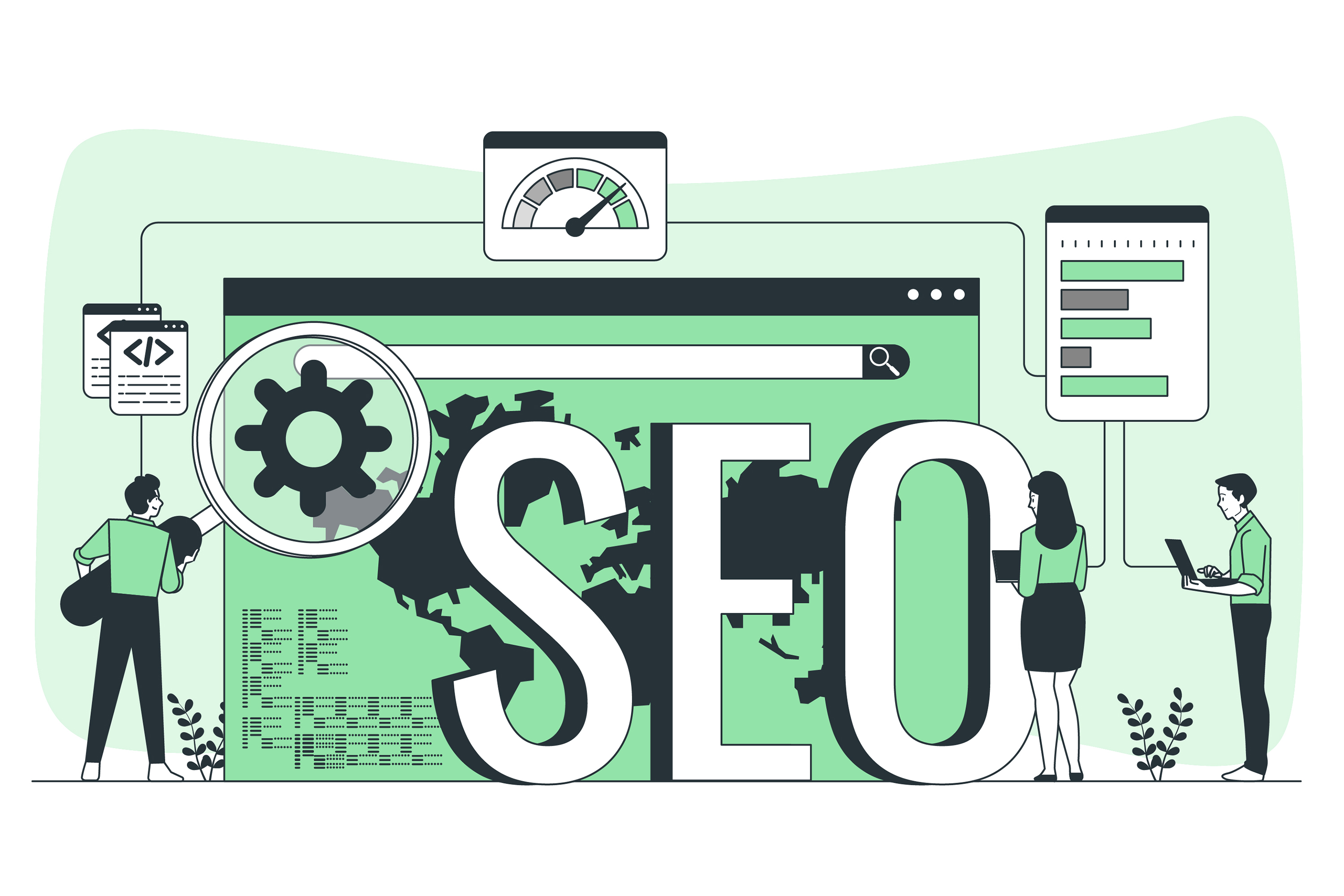Optimizing WordPress for SEO is the process of making a WordPress site more visible on search engines like Google. When people search for something related to your site, good SEO helps your site appear higher in the results. Search engine optimization for WordPress includes choosing the right keywords, making pages load faster, writing helpful content, and getting other websites to link to yours. It also involves using tools like SEO plugins to make sure your site follows best practices.
Since WordPress is built with SEO in mind, it is easier to optimize compared to other website platforms. With the right setup, SEO optimization for WordPress can help your site rank well and bring in more visitors.

Why WordPress is Best for SEO
WordPress is one of the best platforms for SEO because it is built in a way that makes it easier for search engines to find and rank your content. Many businesses, bloggers, and online stores use WordPress because it helps them get more visitors from search engines. Is WordPress good for SEO:
- WordPress has clean code. Search engines prefer websites with clean and simple code. WordPress follows coding standards that help search engines understand what your site is about. When search engines can easily read your site, they are more likely to rank it higher.
- SEO plugins make optimization easy. WordPress offers powerful SEO plugins like Yoast SEO and Rank Math. These tools help users improve their content by suggesting keyword placements, adding meta descriptions, and fixing errors that could hurt rankings. They guide users step by step, making SEO with WordPress easier for beginners.
- Mobile-friendly designs. Many WordPress themes are responsive, meaning they adjust to different screen sizes. Since Google ranks mobile-friendly sites higher, having a WordPress site gives you an advantage. You do not need extra effort to make your site work well on phones and tablets.
- Fast loading speed. Website speed is important for SEO. If a site takes too long to load, visitors leave quickly, which can hurt rankings. WordPress has lightweight themes and caching plugins that help make pages load faster.
- Easy content management. Optimizing WordPress for SEO includes writing fresh and relevant content. WordPress makes it easy to update old content, add new pages, and organize posts. The built-in blog feature encourages regular content creation, which helps improve rankings.
- Customizable URLs and permalinks. WordPress custom web development allows users to create simple and clear URLs. A well-structured URL helps search engines understand the page topic and improves click rates.
- Strong security features. Google prefers secure websites. WordPress offers security plugins and SSL certificate support to keep websites safe. A secure site builds trust with visitors and improves SEO rankings.
Due to these reasons, WordPress is one of the best choices for building an SEO-friendly website.

How to Optimize SEO on WordPress
Having a WordPress website is great, but to get visitors, you need SEO. SEO makes sure your site appears on Google when people search for topics related to your content. Without SEO, your site may stay hidden. SEO on WordPress is not complicated if you follow simple steps. You do not need to be an expert to improve rankings. With a few smart adjustments, your site can start getting more traffic. Below are five SEO WordPress tips to make your site better for search engines.
1. Choose the Right SEO Plugin
WordPress search engine optimization plugins help make things easier. The most popular ones are Yoast SEO and Rank Math. These plugins guide you on improving your content, adding keywords, and fixing errors that may hurt your rankings.
How to use an SEO plugin:
- Go to your WordPress dashboard.
- Click on "Plugins" and then "Add New."
- Search for "Yoast SEO" or "Rank Math."
- Install and activate the plugin.
- Follow the setup wizard to adjust settings.
The plugin will help you write better titles, add descriptions, and structure your pages in a way that search engines like.
2. Optimize Your Website Speed
A slow website hurts your SEO because visitors do not like waiting. If your pages take too long to load, people leave, and Google notices.
How to improve speed:
- Use a Fast Hosting Service – A good host makes a big difference. Choose a company that offers fast servers and good customer support.
- Optimize Images – Large images slow down pages. Use tools like Smush or TinyPNG to reduce file size without losing quality.
- Enable Caching – Caching saves parts of your site so it loads faster next time. Install a caching plugin like WP Rocket or W3 Total Cache.
- Minimize Plugins – Too many plugins slow down a website. Remove unnecessary ones.
A faster site keeps visitors happy and improves rankings.
3. Use SEO-Friendly URLs
A good URL structure helps search engines and users understand your page. Instead of using long or confusing URLs, keep them short and simple.
How to improve WordPress website SEO:
- Go to "Settings" in WordPress.
- Click on "Permalinks."
- Select "Post Name" instead of the default option.
Now, your URLs will look clean, like this: yourwebsite.com/best-coffee-recipes. Instead of this: yourwebsite.com/?p=123.
This small change makes it easier for people and search engines to understand your content.
4. Write Quality Content with Keywords
Search engines love useful content. The more valuable your content is, the better your rankings. Keywords help search engines understand your topic, but stuffing too many keywords can hurt your rankings.
How to write SEO-friendly content:
- Do Keyword Research – Use free tools like Google Keyword Planner or Ubersuggest to find what people search for.
- Use Keywords Naturally – Add keywords in the title, first paragraph, and throughout the content, but make sure it sounds natural.
- Write Clear and Helpful Content – Avoid writing just for search engines. Make your content easy to read and useful for people.
- Update Old Content – Fresh content ranks better. If you have old blog posts, update them with new information.
Good content keeps visitors on your site longer, which helps improve rankings.
5. Get Backlinks from Other Websites
A backlink is when another website links to your content. Search engines see this as a sign that your site is valuable. The more quality backlinks you have, the higher your site will rank.
How to get backlinks:
- Write Guest Posts – Offer to write articles for other websites in your industry. In return, they link back to your site.
- Share on Social Media – The more people see your content, the more likely they are to share it.
- Ask for Links – If you mention another website in your content, email them and ask if they can link back to your article.
Backlinks help build trust and improve your ranking on Google. Step-by-step SEO for WordPress does not have to be difficult. By choosing the right SEO plugin, making your site faster, using good URLs, writing quality content, and getting backlinks, you can improve your rankings and bring more visitors to your site. Start small, apply these steps, and keep improving over time. The better your SEO, the more people will find your website.

Best Practices for SEO Optimization on WordPress Sites
SEO is key to getting your WordPress site noticed online. With so many websites out there, it's important to stand out. Here are some simple and easy-to-understand practices to help your WordPress site rank higher on search engines like Google.
Pick the Right Keywords
Keywords are the words people type into search engines. Choosing the right keywords for your site is important. Think about what your audience would search for. For example, if you sell shoes, you might use keywords like “buy shoes online” or “best running shoes.” Once you know your keywords, use them in the title, content, and meta description of your posts or pages. But don’t overdo it! Make sure your content still reads naturally.
Use SEO-Friendly Themes
Your WordPress theme should be easy for search engines to read. Some themes are better for SEO than others. Look for themes that are mobile-friendly, fast, and clean. These themes make it easier for Google to understand your site and show it to the right audience. There are many WordPress SEO-friendly themes available, both free and paid. When choosing one, check the reviews and see if it loads quickly. The faster your site loads, the better it will rank.
Optimize Your Titles and Meta Descriptions
Titles and meta descriptions are important because they show up on search engines. They also tell visitors what your page is about before they click.
A good title should include your main keyword and be clear. For example, “Best Running Shoes for Women in 2025.” Keep your title under 60 characters, so it doesn’t get cut off in search results. Meta descriptions give a brief summary of your page. Keep them under 160 characters. Use your keywords here, too, but make it sound interesting. This will help encourage people to click.
Use Permalinks Wisely
Permalinks are the URLs for your posts and pages. Make them simple and easy to understand. WordPress web development gives you a default permalink structure, but it’s a good idea to customize it.
For example, instead of “www.example.com/?p=123,” use “www.example.com/best-running-shoes.” This not only helps SEO but also makes your link clearer for people.
Add Alt Text to Images
Alt text is a description of an image. It helps search engines understand what the image is about. It’s also useful for people who can’t see the image. When you upload an image, always add a short, clear description of what it shows. For example, instead of “image123.jpg,” use “red-running-shoes.jpg.” This simple step can help improve your SEO.
Write Quality Content
Content is one of the most important parts of WordPress SEO-friendly. Your content should be interesting, helpful, and easy to read. It’s also a good idea to update old content. Fresh, up-to-date content is more likely to rank higher.
Try to answer common questions your audience might have. Use headings and short paragraphs to make the content easier to read. You can also add images, videos, or infographics to make your posts more engaging.
Use Internal Linking
Internal linking means linking to other pages or posts on your website. This helps search engines discover more of your content and helps your visitors find related articles. For example, if you write a blog post about running shoes, you might link to another post about the best shoe brands. This keeps visitors on your site longer and helps with SEO.
Focus on Mobile Optimization
More people use their phones to browse the web than ever before. That’s why it’s important to make sure your site looks good and works well on mobile devices. Choose a WordPress theme that’s responsive, meaning it will adjust to different screen sizes. Check your site on a phone to see how it looks. If it’s hard to read or navigate, visitors might leave quickly.

Speed Up Your Site
A slow website is bad for both users and SEO. If your site takes too long to load, people will leave before it even opens. There are many ways to speed up your WordPress site. One easy fix is to compress your images so they load faster. You can also use caching plugins that store parts of your site to make it load quicker for visitors.
Use SEO Plugins
WordPress has several plugins that improve SEO for WordPress. One of the most popular is Yoast SEO. This plugin helps you optimize your content, meta descriptions, and even check for broken links. With these plugins, you can get helpful tips on how to improve your content for SEO. They’ll guide you to make sure your content is ready for search engines.
Use Backlinks
Links pointing to your website from other websites are known as backlinks. Linking to your material from other websites indicates to search engines that your website is reliable. Writing guest posts on other blogs, requesting links from partners, or being included in internet directories are all ways to obtain backlinks. Just make sure you only provide links to reliable websites.
Regularly Update Your Site
Keeping your website fresh is key to SEO optimization and WordPress support. Regularly update your content and add new posts. Search engines love fresh content. When you update old posts, add new information, or improve the quality, it helps keep your site relevant. Don’t forget to check for broken links as well. Broken links can worsen your SEO and frustrate visitors.
SEO might seem complicated, but it doesn’t have to be. By following these simple steps, you can take your WordPress site to the top of search engines. Remember to focus on creating quality content, using the needed keywords, and making your site fast and mobile-friendly. Over time, these efforts will help you attract more visitors and grow your site’s reach.
